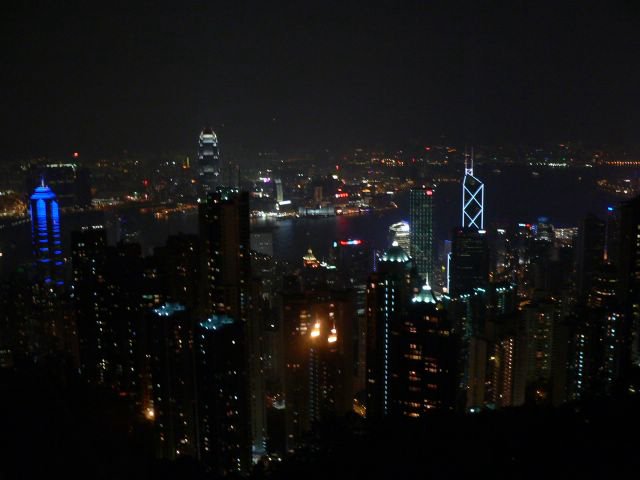
Sunday, December 25, 2005
Friday, December 23, 2005
Wrap up of Democractic Demonstration on Dec.4th
Government officials blamed Bishop Zen and Legislator Martin Lee that they should be responsible for the standoff. In other words, are the two persons who influenced the final results and turned the scales? Otherwise, is it like what MingPao said today, that is, it was because of the Three Bundle of Cigarettes including Bishop Zen, former chief secretary, Anson Chan and Next Media's Chairman, Jimmy Lai. We should remember the advertising war waged by Jimmy Lai in the late October. We also remember Bishop summoned all the pan-democratic members and called on his followers to protest on Dec.4th. We must remember Anson Chan joined the big march, and also held the press conference later to publicly express the disapproval of government's proposal. It seems to be so. However, can they influence those legislators? If it's in the western countries, we gotta say of course it is; because constituencies' will influence legislators'. HK doesn't embrace full democracy yet, who on earth influences whom? I'd like to anatomize the vote behind the scene next.
The total number of 60 legislators in HK composes of 30 persons by direction election in the respective constituencies and of the rest by functional constituencies. In the Legco election in 2004, pro-democratic camp won the 60% of the votes in the direct election, while pro-Beijing camp won the 77% of the votes in the election of functional constituencies. Before the vote on the proposals, government can definitely get 11 votes from pro-Beijing legislators who come from direct election, plus 23 votes from pro-Beijing legislators who come from functional constituencies. The eight independent legislators without party background had become the determinant factor. But the four who come from direct election won't definitely vote for the proposal, because they knew what their constituencies thought. The result is that one of them abstained (I think he took both his political wisdom and risk). Until now, there has been not any chance for government to win the 2/3 votes to pass the proposal. The rest in the functional constituencies hadn't mattered to the whole situation. The media in Hk said the legislator from the Accountant field is the miss democracy. That's too sensational, too much to say that. We can see a reality from the vote, there are seven fields in the functional constituencies are the democratic power, which represents 25% of the total number of 28 functional fields. The government's proposal about the Legco increased the total seats from 60 to 70, and five of them are from direct election; the rest of them are from district council members. However, 102 of the total 529 district council members are appointed by Chief Executive. That is why many people oppose to the proposal and call for universal suffrage. I dare say Beijing would compromise, and HK government would give the new proposal which both sides can accept. When will be the universal suffrage for HK? 2007/2008? 2012? Judged by the current information, 2012 seems to be more possible. You bet? I just hope so.
Tuesday, December 20, 2005
Hong Kong blogger in the demonstration against WTO: Report personally
(the photo in this article was taken by Simon Song at Curbside)
Wednesday, December 14, 2005
Shanwei Incident Implied the Cost of China’s Economic Miracle
Friday, December 09, 2005
Roundups of the march in HK-babies' festival
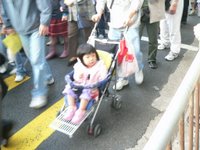 The press in Hong Kong were debating the motivation why Anson Chan joined the march on Dec. th recently. And, they also reported that the different reations to comparison between Anson Chan and Aung San Suu Kyi which I first broached in my blog. It seems that democractic camp doesn't like Anson Chan very much. Tt's interesting to observe the progress of political situation in HK. There isn't any absolute accredited political leader in HK, and their political performances are mediocre, but they would rather be the leader themselves.
The press in Hong Kong were debating the motivation why Anson Chan joined the march on Dec. th recently. And, they also reported that the different reations to comparison between Anson Chan and Aung San Suu Kyi which I first broached in my blog. It seems that democractic camp doesn't like Anson Chan very much. Tt's interesting to observe the progress of political situation in HK. There isn't any absolute accredited political leader in HK, and their political performances are mediocre, but they would rather be the leader themselves.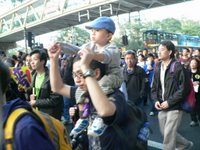
I interviewed serveral persons who were joining the march on that day.
A pro-Taiwan organization named Confederation of Free League & China Youth-Service League in Hong Kong said, ““Father of China”, Mr. Sun Yat-sen, had told us that people couldn't have their own rights until the country has democracy, yet we are still arguing whether democracy is good and right, or not”. They said that political situation in
Two retirees who took hold of banners calling for  universal suffrage said they decided to come to the march from the very beginning. They came there not for themselves, but for the youth. They thought that Donald Tsang's proposal was unreasonable and it would deprive people's human right. Another old marcher also said he came to struggle for his children. A college student said that he and his classmates decided to come to the march from the very beginning as well. He also touched on the ads heavily placed by pro-democracy camp before the march. “The ads just specified the details of the march; I came here not being influenced by them”. A clerk said they decided to come at the early beginning. She also mentioned that most of her friends came to join the demonstration. An elderly retired person who had been standing outside the parade said that he
universal suffrage said they decided to come to the march from the very beginning. They came there not for themselves, but for the youth. They thought that Donald Tsang's proposal was unreasonable and it would deprive people's human right. Another old marcher also said he came to struggle for his children. A college student said that he and his classmates decided to come to the march from the very beginning as well. He also touched on the ads heavily placed by pro-democracy camp before the march. “The ads just specified the details of the march; I came here not being influenced by them”. A clerk said they decided to come at the early beginning. She also mentioned that most of her friends came to join the demonstration. An elderly retired person who had been standing outside the parade said that he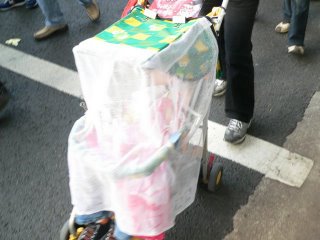 supported the universal suffrage; the reason why he didn’t join the march was because he preferred to look into the process of the whole march. “If I join the march personally, I can not see what happens in the behind of the parade”.
supported the universal suffrage; the reason why he didn’t join the march was because he preferred to look into the process of the whole march. “If I join the march personally, I can not see what happens in the behind of the parade”.
There were lots of prams in the march then. It seemed to be a festival indeed. Babies enjoyed the march, but their parents had a more ponderous mission for Hong Kong's future.
Tuesday, December 06, 2005
Roundups of the march in HK-about Anson Chan
 The roundups of the march on Dec. 4th should be done yesterday, but I composed a reaction story of Hong Kong bloggers for the Global Voices in the Berkman Center at Harvard Law School.
The roundups of the march on Dec. 4th should be done yesterday, but I composed a reaction story of Hong Kong bloggers for the Global Voices in the Berkman Center at Harvard Law School.First of all, I added the video clip about Anson Chan joining in the march.
Google Video.
The newspaper in HK today talked a lot about why Anson Chan attended the march in a lofty stance. Some said that she might decide to run for the CE in 2007, some said she cannibalized the fruits of pan-democratic camp, some said she wasn't a very enlightened when she was in office, and some even said that she should also be responsible for the failure of governance and economy both in the colonial and Tong CheeHua's time. The march was that Anson Chan showed her attitude to Beijing most strongly in the wake of her essay named Trust Us in Time magazine in June 2004.
Press also mentioned that Anson Chan once had the highest popularity wehn she was in offfice, even higher than the current favorite of HK people, Donald Tsang. It seems that she will probably replace Tsang, if she can run for the post of CE later. And, some bystanders during the march then joined them when they saw Anson Chan was among the parade. It seemd that Anson Chan had the engough preparation for the march.
When I was interviewing in the march, I heared some people said Anson Chan didn't need to attend the march personally necessarily. They explained that people knew what Anson Chan thought, and that her presence only made trouble for herself. That's a typical and general thought about Chan's acts. They believed Chan just supported the appeal like any other general citizens.
I'm interested in what Anson Chan will do next. Will she emulate Aung San Suu Kyi,who is considered as the democratic hero in Bruma, and got the Nobel Peace Prize in 1991.
Here is an interview record of Anson Chan by PBS (America's public broadcasting corporation) in 1998 below. It seemd that she has been craving for the universal suffrage in 2007 all the time.
PHIL PONCE: You talked about the record turnout for the recent elections, and yet, the majority of the people who cast their votes in the popular vote voted for pro-democracy candidates and some of those candidates-Martin Lee, for example,--are saying that the time is now for immediate one person, one vote.
ANSON CHAN: I think, of course, people in Hong Kong want more democracy. That is, in fact, what they will get in accordance with the timetable for the development of democratic institutions, that is, election to the legislature. In accordance with our basic law, which is our constitution, there is a specifically laid-out timetable to reach the ultimate target of universal suffrage. And so for our next election, which will be in the year 2000, the number of directly-elected seats in the legislature will increase to 24, and in the year 2004, it will be half the legislature that will be returned by popular vote. And in the year 2007, in accordance with that timetable, the people of Hong Kong can decide for themselves whether to move straight away to universal suffrage.
Sunday, December 04, 2005
Hong Kong was in the march
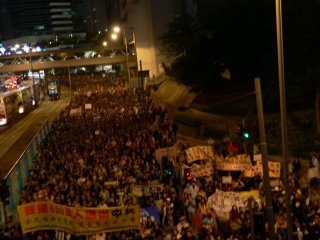 The intensified debate or even propaganda war on universal suffrage in the past days rang down the curtain this afternoon. Total over 200,000 people was claimed to join the march which started in the Victoria Park in Hong Kong.
The intensified debate or even propaganda war on universal suffrage in the past days rang down the curtain this afternoon. Total over 200,000 people was claimed to join the march which started in the Victoria Park in Hong Kong.The biggest news about this march is that former Chief Secretary of HK, Anson Chan attended the march in the name of herself. Mrs. Chan has been called the Conscience of Hong Kong because she insisted on the interests of Hong Kong. She was forced to resign in 2001 by Beijing government.
The total number of protesters is controversial in eve
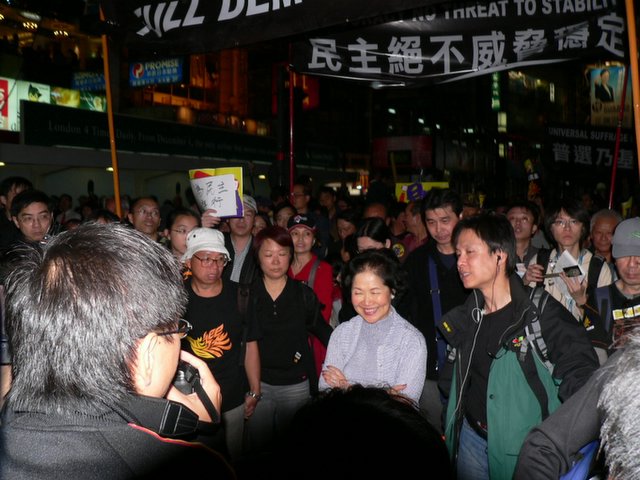 ry march in HK. Police department said the total figure is 63,000, but the organizer of the march said the total figure amounts to 250,000. I also once calculated the number by different means. When I first got in the park, I counted the total number of people in the single pitch. There were approximately 3000 persons every pitch, and if so, the total protesters will have 36,000(3000 persons multiply by 12 pitches) in the pitches. The total figures in the Victoria Park probably have 40,000 circa (plus the persons outside the pitches) at 3pm. The march started at 3:10pm or so. I went out of the park, and counted the traffic. There were 600 persons who went by me every minute, and so I speculate that the total number of protesters in the street is 78,000 or so. Even if adding the people joining halfway, the total number at most is about 100,000.
ry march in HK. Police department said the total figure is 63,000, but the organizer of the march said the total figure amounts to 250,000. I also once calculated the number by different means. When I first got in the park, I counted the total number of people in the single pitch. There were approximately 3000 persons every pitch, and if so, the total protesters will have 36,000(3000 persons multiply by 12 pitches) in the pitches. The total figures in the Victoria Park probably have 40,000 circa (plus the persons outside the pitches) at 3pm. The march started at 3:10pm or so. I went out of the park, and counted the traffic. There were 600 persons who went by me every minute, and so I speculate that the total number of protesters in the street is 78,000 or so. Even if adding the people joining halfway, the total number at most is about 100,000.There are still many different appeals in this march besides the universal suffrage. For example, Falungong (2), anti-WTO (2), pro-Taiwan organization, human rights group, overseas Chinese democratic organization, civil radio, children and women organization (2), elder people organization, postal labor union, estate labor union,educational unions (2) (3), journalists' organization, the persons whose rights are abused by others (2), and some other organization also joined the march.
The protesters arrived at the Government Offices in Battery Path, and requested that Chief Executive, Donald Tsang, went out to meet them. However, Donald Tsang met the press at 8:45pm in his Government House. He said that he knew what Hong Kong people required, and he believed he can see the day when universal suffrage comes even if he has been over 60 years old. The protesters left at 9pm even if they dissatisfied with what Donald Tsang said. Some of them claimed that they will come back next Saturday.
It's the first time that I complained to myself about the insufficient memory for my digital camera. I can take 150 photos at the resolution of 2560*1920, but I had to delete many photos taken earlier and changed the picture quality to 1900*1600 at the time when the march just began for an hour.
Friday, December 02, 2005
Showdown for Democracy Debate in HK
 (illustration: the march will begin from Soccer pitches of Victoria Park, Causeway Bay at 3pm on Dec. 4. The terminal point of the march will end at the Government Offices in Central. The march will pass through Causeway Road, Yee Wo Street, Hennessey Road, QueensWay, Queens Road Central, and end at Battery Path.)
(illustration: the march will begin from Soccer pitches of Victoria Park, Causeway Bay at 3pm on Dec. 4. The terminal point of the march will end at the Government Offices in Central. The march will pass through Causeway Road, Yee Wo Street, Hennessey Road, QueensWay, Queens Road Central, and end at Battery Path.)Propaganda war on the democratic proposal in Hong Kong went on today. In the wake of TV address by Chief Executive of Hong Kong, Donald Tsang, pan-democratic camps wages
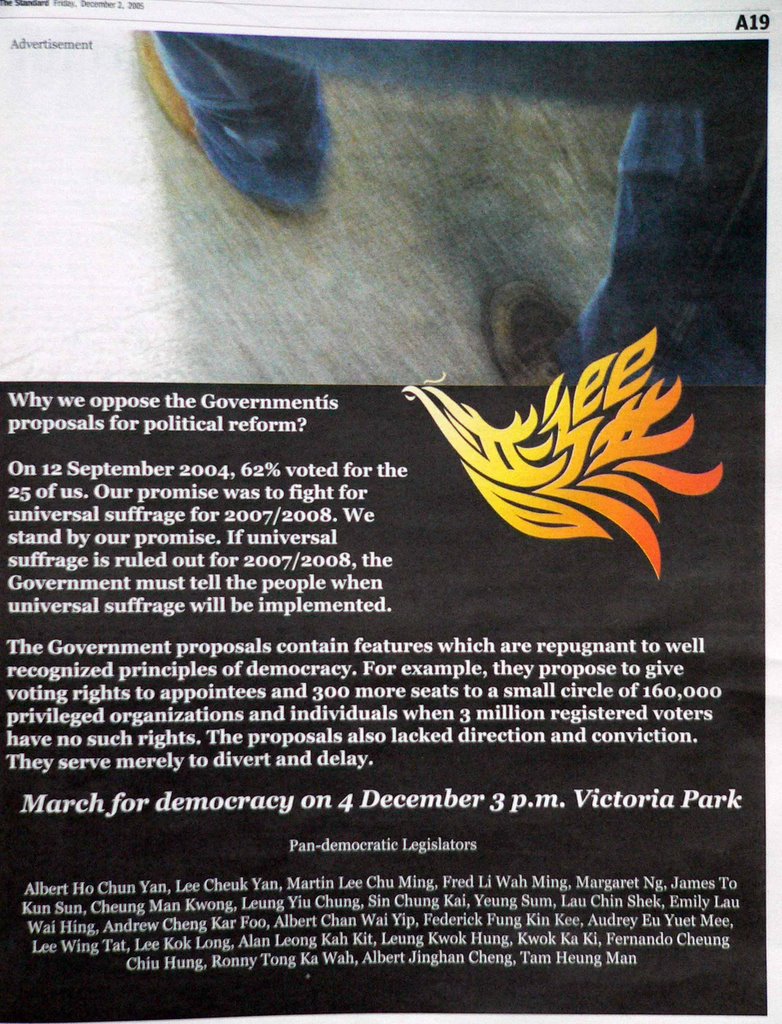 more intensified attacks against government's proposal, and called on people to protest by more versatile means.
more intensified attacks against government's proposal, and called on people to protest by more versatile means.Today, the 25 pan-democratic legislators placed joint full page ads on the two English daily newspaper (the Standard, South China Morning Post) for the first time. Besides, they also advertised on Apple Daily, Mingpao, Economic Daily News, Economic Journal and Am730(the new free paper in HK) in the full page color. Moreover, the Next Media magazine which is the member of Next Media Group with Apply Daily dispatches spread page insert to call for universal suffrage (it seems that they wish people to hold it to protest then). There were six full page ads to call on people to protest in today's Apple Daily (including Christian church and some democratic organizations of China). What a money competition!
What should be pointed out that Democratic camps has begun to attempt the new means, such as webBlog , Internet live radio and Postcast (People's Radio Hong Kong-香港人民廣播電臺), video clips (video 2, video 3) and viral marketing.
At the same time, the camps to support government also placed ads, but their voice seems to be weak compared to the opposite side.
Interestingly, the organizer of Dec.4th March declaimed that their base website was attacked by hacker (http://www.rebuildhk.com). I guess the attack might come from mainland if it was real. It is interesting to observe the reactions to the march from mainland people. The behavior of hacker may be one of the strong reactions.
Thursday, December 01, 2005
Propaganda War in HK Warmed up
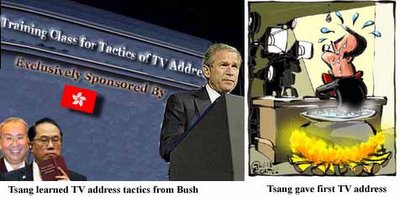 Today, all but the frontpages of the press in Hong Kong are story about chief Executive, Donald Tsang, gave a 5-minute TV address through the three TV stations (the other three radio stations also broadcasted his speech simultaneously) at the prime time (7:30pm) yesterday (full texts in Chinese , media coverage in English).
Today, all but the frontpages of the press in Hong Kong are story about chief Executive, Donald Tsang, gave a 5-minute TV address through the three TV stations (the other three radio stations also broadcasted his speech simultaneously) at the prime time (7:30pm) yesterday (full texts in Chinese , media coverage in English).Almost the press all said that Tsang emulated George W. Bush, in order to win the support of his democratic proposal probably from elderly and female citizens in a emotional way (TV viewers are generally considered as more emotional than the readers of press). Some of the major Chinese media said Tsang threatened citizen to support him, otherwise they would never have universal suffrage (Apply Daily's story), some of them said the Tsang's first trial of TV address was inexperienced and unsuccessful hereby, some of economic press calculated the cost Tsang's address should take (Tsang's address was free), such as Economic Daily News and Economic Journal, some of them seemed to be more neutral, such as Standard's Tsang makes TV appeal on reforms, and some of pro-Beijing media said Tsang's address gets high marks.
Besides the TV speech Donald Tsang addressed yesterday,HK government officials, even the officials from Beijing also try to influence the possible turn-out of March on Dec. 4th by all means. Oppositely, the democratic camps went on waging their advertising attacks these days. An ad purporting to be a mother who has been caring about universal suffrage since 1980s was paralleled to oppose to the TV address by Donald Tsang, and the Democratic Party of HK called for people to join the march on Sunday (the other one).
Disaster information in China Should be more transparent
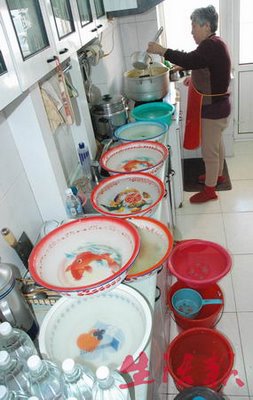 Today, I saw an essay on Caijing magazine which is a famous economic journal in China. It said that the information about epidemic situation can not be exported first and then sold back to domestic market (疫情不能出口轉内銷), which means that epidemic information should not be reported first by foreign media. That actually minces its word to criticize that Chinese government always hide epidemic information, such as SARS, bird flu, and mine coal explosion, etc.
Today, I saw an essay on Caijing magazine which is a famous economic journal in China. It said that the information about epidemic situation can not be exported first and then sold back to domestic market (疫情不能出口轉内銷), which means that epidemic information should not be reported first by foreign media. That actually minces its word to criticize that Chinese government always hide epidemic information, such as SARS, bird flu, and mine coal explosion, etc.Although the information of natural disaster in China has not been considered as the state secrets any more since last year, the Chinese official especially local officials who are afraid of possible negative impact on their political career still wouldnÂ’t rather disclose those information timely and fully. However, there have been too many bloody lessons in China because those officials cover and delay the epidemic information. The innocent people are vulnerable; they much depend on the information provided by government. If our government still disregards it, they are indeed burying their people with their hands which should be used to help people.
